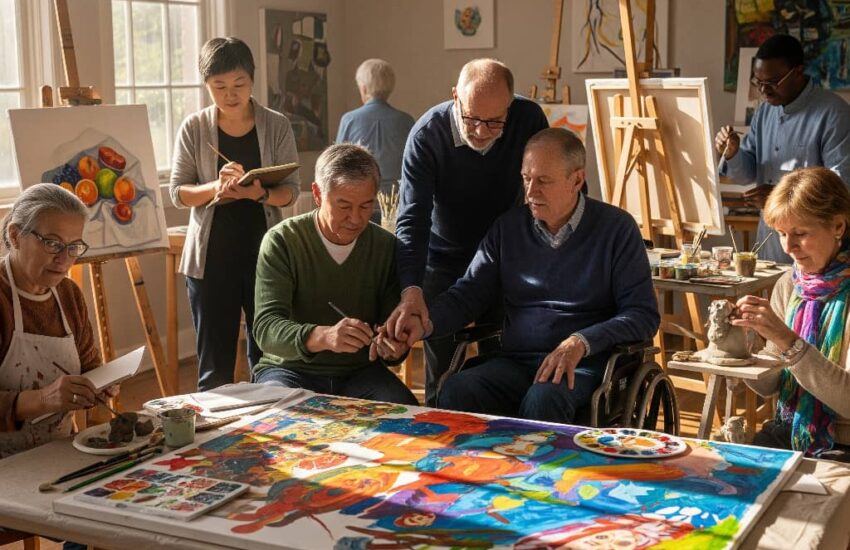Adult day care offers far more than babysitting for seniors. Discover how these programs boost cognitive health, provide social connection, and give caregivers crucial breathing room. The first time I dropped my father off at adult day care, I sat in the parking lot and cried for twenty minutes. Not because he was upset, he’d already wandered off to join a painting class, but because it was the first quiet moment I’d had in months. As his primary caregiver since his Alzheimer’s diagnosis, I’d been running on fumes, surviving on stolen naps and microwave meals. What I didn’t realize then was that Sunshine Center would become not just my lifeline, but his salvation too.
These programs are often misunderstood as mere holding pens for the elderly, but the reality is far richer. At my father’s center, the mornings begin with “cognitive calisthenics” not dreary memory drills, but lively debates about classic movies, trivia contests where wrong answers earn the biggest laughs, and storytelling circles that somehow draw out memories he can’t access at home. The social worker explained that structured social interaction slows cognitive decline more effectively than most medications. I saw proof when Dad started recalling neighbors’ names at the center while still forgetting mine, his brain was responding to the daily mental workout.
The physical benefits surprised me most. Where I struggled to get Dad to take short walks around our block, the center’s “walking club” covering the perimeter of their garden had him clocking a mile daily without complaint. The difference? Social motivation, he wouldn’t let his new friend Martha “show him up.” Their adapted yoga classes accommodate wheelchairs and limited mobility, while the dancing sessions (set to big band music) improve balance better than any physical therapy session I could force on him at home.
For caregivers, the gift isn’t just hours of freedom, it’s the expertise we tap into. The center’s nurses noticed Dad’s UTI symptoms days before I did. Their nutritionist adjusted his meal plan when they observed swallowing difficulties I’d missed. I now arrive for pickup with a notebook, ready to receive the subtle observations about his health and mood that my exhausted eyes had stopped seeing.
Perhaps the most profound benefit is the emotional transformation. At home, Dad’s world had shrunk to the four walls of our living room and the increasingly frustrating gaps in his memory. At Sunshine Center, he’s not a patient, he’s the guy who tells the best WWII stories, the checkers champion, the one who remembers everyone’s coffee order. The staff’s genius lies in working with what remains rather than focusing on what’s been lost. Watching him flourish there made me realize I’d been caring for his disease rather than nurturing his personhood.
The financial practicality can’t be overlooked. Compared to in-home care ($25-$35/hour in our area) or assisted living ($5,000+/month), day programs ($75-$150/day) provide affordable relief. Many accept Medicaid waivers or long-term care insurance, and some veterans’ programs cover costs completely. That financial breathing room reduces the impossible choices so many caregivers face between their loved one’s care and their own financial survival.
For me, the unexpected gift has been reclaiming my identity beyond “caregiver.” Those five hours daily let me work part-time, see friends, or sometimes just sleep, basic human needs I’d sacrificed without realizing the cost. I return to pick up Dad not drained and impatient, but as something resembling the daughter he remembers. The staff jokes that they care for caregivers as much as seniors, and I believe it.
What began as a desperate attempt to catch my breath has become the rhythm that sustains us both. Dad gets stimulation and care from professionals while I get the space to miss him, to remember who we were before Alzheimer’s entered our lives. The photos on the center’s walls, seniors planting gardens, acting in skits, celebrating birthdays, tell the real story: this isn’t about warehousing the elderly, but about helping them live fully in whatever ways they still can.
References
Tse, M. M. Y., & Howie, L. (2018). The role of adult day services in supporting the occupational participation and well-being of people with dementia and their primary carers: An integrative review. *PLoS ONE*, 13(5), e0197454. https://doi.org/10.1371/journal.pone.0197454
This review highlights that adult day services reduce social isolation, anxiety, and depression, improve quality of life, and delay early institutionalization by engaging attendees in meaningful activities while providing caregiver support.
Duncan, S. F., Zarit, S. H., & Gitlin, L. N. (2016). Evaluating the effectiveness of adult day care on alleviating caregiver stress. *Florida Public Health Review*, 13(1), 3-17. https://digitalcommons.unf.edu/fphr/vol13/iss1/3/
This study documents how adult day care programs reduce caregiver depression, anger, and subjective burden, improve morale, and help caregivers manage care recipients’ behaviors more confidently.
Kane, R. L., & Cutler, L. J. (2024). Adult day services: A potential antidote to social isolation and its impacts on health among older adults. *Frontiers in Public Health, 12*, Article 1427425. https://doi.org/10.3389/fpubh.2024.1427425
This research emphasizes adult day services’ role in reducing social isolation and loneliness, providing cognitive and physical activities, nutrition, health monitoring, and caregiver respite.
Shah, M., & Hang, M. (2018). The role of day care in supporting older people living with long-term conditions. *BMC Geriatrics, 18*, 235. https://doi.org/10.1186/s12877-018-0942-9
This study found that older adults participating in day care programs had improvements in physical, emotional, and cognitive domains.
Parker, D., Mills, S., & Abbey, J. (2024). Adult day programs and their effects on individuals with dementia and their caregivers: A systematic review. *Systematic Reviews, 13*, 265. https://doi.org/10.1186/s13643-024-02683-1
This review reports positive effects on caregivers including reduced stress, worry, depression, and improved well-being and confidence.
Harvard Health Publishing. (2024, November 14). Adult day care can benefit older adults and their caregivers. Harvard Medical School. https://www.health.harvard.edu/staying-healthy/adult-day-care-can-benefit-older-adults-and-their-caregivers
This article outlines how adult day care alleviates loneliness, offers social engagement, and provides caregivers with needed respite.

